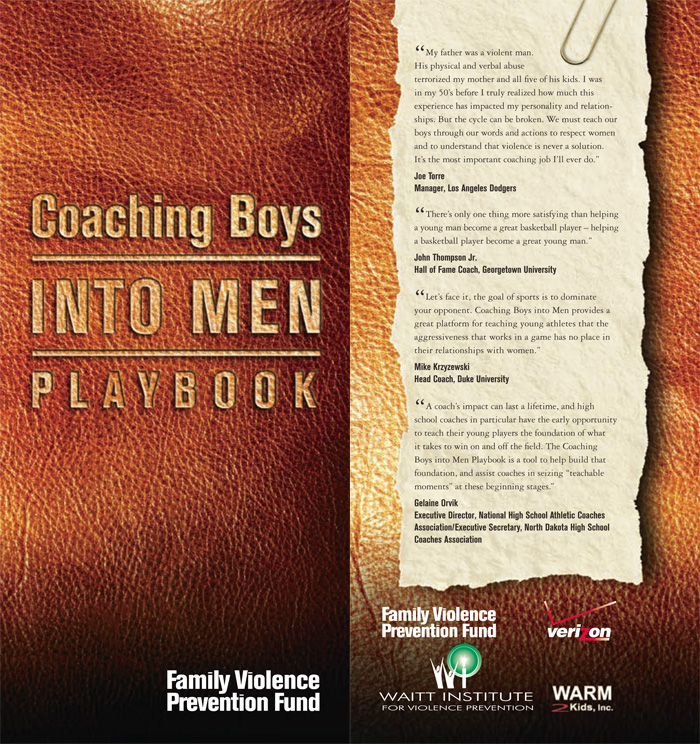Coaching Boys Into Men: Coaches Leadership Program

The Coaching Boys into Men (CBIM) Kit provides high-school coaches with a clear program comprised of useful information, coaching advice, and messages to help teach male athletes the importance of respect for themselves, others, and particularly the women and girls in their lives.
Over the course of a season, CBIM coaches lead their players through brief weekly activities that address themes such as personal responsibility, respectful behavior, and relationship abuse. Teams are encouraged to involve fans, parents, faculty, other students, and school administrators in support of CBIM’s respect message.
Goal: To provide coaches with the tools and resources necessary to talk with their athletes about respect for women and girls and that violence doesn't equal strength.
The CBIM program invites men to utilize their influence to prevent domestic and sexual violence. CBIM began as a national public service announcement campaign and included TV, radio, print, and online components. First launched in 2001, in partnership with the Advertising Council, CBIM’s initial goal was to inspire men to teach boys the importance of respecting women and that violence never equals strength. Over time, CBIM has become a comprehensive violence prevention curriculum for coaches and their athletes.
Futures Without Violence, formerly Family Violence Prevention Fund (FVPF), recognized the importance of engaging men to work toward ending violence against women and girls. CBIM is premised on the finding from a 2000 survey that the majority of men support anti-violence efforts, but didn’t know what to do and/or had never been asked. CBIM materials provide support for actions and approaches that men, particularly coaches and other adult influences can take to teach and to model responsible, respectful behavior.
Impact: A formal study on the effectiveness of the program was conducted in 16 high schools in Sacramento working with approximately 2,000 athletes and 150 coaches. Results of this three- year study showed: athletes in the program are more likely to report doing something when they witness disrespectful and harmful behavior (e.g., telling their coach or another adult, a greater knowledge of abusive behaviors (e.g., language, pressure, control,) along with a trend toward directly reducing abusive behaviors.
It is recommended that an assessment of the interest, readiness, and capacity of the community and the school is conducted. Access this helpful community assessment tool.
Training: Training is available from Futures Without Violence but not required. A Coaches Forum is coming soon to facilitate sharing and networking.
Capacity: “CBIM trainers should be dedicated to ending violence against women and children, be well-versed in the Coaches Kit materials, and be able to connect with coaches and their athletes.” Training is available for individuals to become CBIM trainers to manage and support the community’s Coaching Boys into Men implementation. It is recommended that the following combination of individuals work closely together: an athletic coach or athletic director, a domestic violence prevention activist, and a school administrator such as a principal.
Cost: The cost of the tool kit if ordered online is $35.00. However it can be downloaded and printed from the website at no cost.

